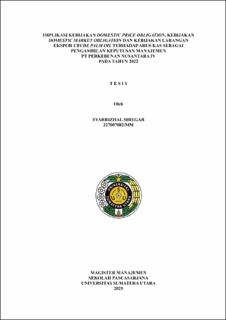Implikasi Kebijakan Domestic Price Obligation, Kebijakan Domestic Market Obligation dan Kebijakan Larangan Ekspor Crude Palm Oil terhadap Arus Kas sebagai Pengambilan Keputusan Manajemen PT Perkebunan Nusantara IV pada Tahun 2022
The Implications of The Domestic Price Obligation Policy, Domestic Market Obligation Policy and The Export Ban of Crude Palm Oil to Cash Flow as a Management Decision Making At PT Perkebunan Nusantara IV in 2022

Date
2025Author
Siregar, Syahrizhal
Advisor(s)
Nasution, Fahmi Natigor
Syahyunan
Metadata
Show full item recordAbstract
The Domestic Price Obligation (DPO) policy and Domestic Market Obligation (DMO) policy
implemented on January 27, 2022, along with the Presidential directive on the export ban of
Crude Palm Oil (CPO) on April 28, 2022, had an impact on cash flow as a basis for decision
making within the company. Cash flow reflects a comprehensive picture of cash inflows and
outflows from operating activities, investing activities, and financing activities. This study aims to analyze the impact before, during, and after the DPO policy, DMO policy, and the export ban policy on the company's cash flow and to understand the decisions made by the management based on the cash flow analysis of PT Perkebunan Nusantara IV in 2022. The method used in this research is a comparative descriptive analysis, comparing two or more data groups to describe and identify differences or similarities between these groups. The sample in this study is the cash flow report data from PTPN IV, specifically from Triwulan III 2021 to Triwulan IV 2022. In the testing process, the study employs ratio analysis as a reference to illustrate that the events being tested led to cash flow reactions. Several tests were performed, including the descriptive statistic test, Shapiro-Wilk test, and paired sample test. The results of these tests can provide an understanding of the company's cash flow to inform management decision-making reports. Based on the statistical test results, it was found that there was a difference in the Cash Long Term Debt Coverage Ratio before and after the policy, with an average difference of 0.029 and a significance level of 0.026. Additionally, there was a difference in the Overall Cash Flow Ratio before and after the policy, with an average difference of 0.223 and a significance level of 0.012. Based on these findings, the management decision taken by the company was to restructure its banking debts. Moreover, there was a difference in the Quality of Sales Ratio before and during
the policy, with an average difference of 0.239 and a significance level of 0.012. Based on this, the management decision made by the company was to delay sales. Overall, these policies forced PT Perkebunan Nusantara IV to adjust its operational and financial strategies, leading to rational, reactive, and adaptive management decisions. Although these policies were intended to maintain national economic stability, they also posed significant challenges for the company in terms of profit optimization and cash flow management.
